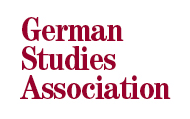Contemporary Church History Quarterly
Volume 19, Number 1 (March 2013)
Conference Report: German Studies Association Conference, October 4-7, 2012, Milwaukee, Wisconsin
By Kyle Jantzen, Ambrose University College
 Once again this past year, the German Studies Association conference included a number of interesting panels or papers devoted to contemporary church history.
Once again this past year, the German Studies Association conference included a number of interesting panels or papers devoted to contemporary church history.
The panel “Questioning Nazism as a ‘Political Religion'” offered new research relating to debates around the questions: was National Socialism a fundamentally anti-Christian political movement? Was Nazism itself a political religion, a rival to traditional forms of Christianity? Or, as Richard Steigmann-Gall has argued, was the Nazi Party led by politicians who understood themselves as Christians and even attempted to forge an unorthodox partnership with German Protestants and (to a lesser extent) German Catholics? Three papers approached these questions from complementary directions. Beth Ann Griech-Polelle examined how Nazi ideologues viewed one of Germany’s allies, General Francisco Franco, whose collaboration with the Spanish Catholic Church inspired commentary which was sharply critical of “political Catholicism.” Daniel A. McMillan argued that secularization constituted a significant cause of the Holocaust, in part because the concept of Nazism as a political religion helps explain why the Holocaust, more than any other genocide, was driven by ideology divorced from “practical” considerations. Kyle Jantzen explored the efforts of a Berlin Protestant pastor to fuse Christianity and National Socialism, provoking opposition from both Nazi Party activists and leaders of the pro-Nazi German Christian movement, in the process revealing the many complexities of the relationship between National Socialism and organized religion.
In all, four members of the Contemporary Church History Quarterly editorial team presented papers in three panels scattered throughout the conference. Along with Griech-Polelle and Jantzen, mentioned above, Robert P. Ericksen presented “Antisemitism through the Lens of Denazification: Examples from Göttingen University,” as part of a panel which considered postwar assessments of pro- or anti-Nazi activities during the Third Reich. Here Ericksen continued to develop his recent research on the failings of the denazification process, highlighted by cases concerning German academics. Finally, Steven Schroeder presented “‘The World Will Not Leave Us Alone’: Reconciliation and Peacebuilding in Germany, 1945-1949,” one of the papers in a panel on “Discourses of Victimization and Reconciliation Amid the Rubble.”
Another panel of interest was “The Work of the State and the Work of God: Religious Groups, Social Vocation, and State Violence.” Martina Cucchiara of the University of Notre Dame presented her paper, “Beyond the Concordat: Women’s Religious Negotiation of Free Spaces in Hitler’s Germany.” She discussed the notion of selective accommodation–complying with externals such as the Hitler Greeting and embracing the Nazi vision of community, nationalism, and heroism, while downplaying racial and antisemitic aspects of the regime. Stephen Morgan, also from the University of Notre Dame, contributed the paper “Between Reservation and Extermination: Rhenish Missionaries and the Herrero Genocide,” which explored the complex and compromised relationship between the German missionaries and the Herrero people. Missionaries approved of the reservation system, because it made the Christianization of the African people somewhat easier to accomplish. When the Herrero War ended this experiment, missionaries adapted to the changing conditions, but in the process lost credibility both with Europeans who found them too friendly to the Herrero and with the Herrero, who did not appreciate the missionaries’ encouragement to cease their rebellion. In the end, the missionaries were caught between their Christian interest in evangelism and the government’s interest in mobilizing colonial labour. Suzanne Brown-Fleming, another member of the Contemporary Church History Quarterly editorial team, commented ably on the papers, noting the common process of Christian adaptation to state interest and ideology and pointing out that–at some point–selective accommodation simply turns into assent.
One other paper of interest was James McNutt’s “‘They sought world domination … so he died’ Adolf Schlatter, Deicide, and Der Stürmer.” McNutt compared Streicher’s and Schlatter’s racial and theological attitudes towards Jews, noting linkages between racial hatred and religious antipathy. He argued that Schlatter was an important figure in German Protestantism, and that his social alienation of Jews contributed to their defamation as the evil other, enemies of God, and allies of Satan.
